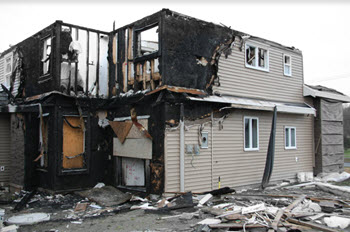
Home After A Natural Gas Explosion
Gas leaks typically refer to the leak of natural gas from a pipeline. Natural gas leaks are particularly dangerous since it has the ability to cause the buildup of pressure. When this happens, it leads to an explosion that can decimate households and whole neighborhoods. In addition to the risk of explosions, a natural gas leak in your home can affect nearby vegetation and release dangerous greenhouse gases into the atmosphere. In this article, we will discuss the signs of a gas leak, the associated risks, and what you should do if you suspect that you have a gas leak in your Hamilton NJ home.
There are several risk factors…
when it comes to the leakage of gas. Digging excavations can potentially hit and damage a pipeline, causing an accident. In the past several decades, aging pipelines has been a growing problem. This is true especially in areas along the northeast where some pipe infrastructure is up to century old. With age, these pipelines rust, pressure points build, and they have a propensity to leak. When there is a leakage of natural gas in a confined space like a basement or a utility hole, it only takes a small spark for it to cause havoc. Situations like the spark of electrical equipment are not unheard of. For these reasons, it’s not hard to see how a natural gas leak is fatal.

Steps To Take If You Think You Have A Gas Leak In Your Home
Vacate Your Home
If you think you have a gas leak, vacate your home immediately. If you’re reading up information because you think you there is a potential gas leak in your home – don’t. Leave the premises immediately and use a neighbor’s telephone to request emergency services. Natural gas is mostly odorless. By the time you notice its effect on you, it may be too late. It causes suffocation if enough of the natural gas is inhaled. Call 911 after you and your pets have left the house.
Do You Smell Sulfur?
 Notice the smell of sulfur. Many gas companies recognize how odorless gas is. It can silently creep into your home without anyone suspecting. That’s why gas companies include a sulfur additive to natural gas so that it imparts a unique smell. A strong smell of sulfur, or rotten eggs, indicates the presence of gas.
Notice the smell of sulfur. Many gas companies recognize how odorless gas is. It can silently creep into your home without anyone suspecting. That’s why gas companies include a sulfur additive to natural gas so that it imparts a unique smell. A strong smell of sulfur, or rotten eggs, indicates the presence of gas.
Use Gas Detectors
A gas detector signals…
when there is an elevated level of gas in the home. This is particularly useful for people who have a diminished sense of smell. Make sure that your gas detector also has the ability to detect carbon monoxide. Your landlord may pay for gas and carbon monoxide detectors if you are a renter.
Turn Off The Gas
If you are near the gas valve near the gas pipe, then turn it off. However, if you do not have direct access to it, then focus on a leaving the premises, taking human occupants and pet animals with you.

Refrain From Using Electronics
Do not turn on electrical devices…
if you suspect a gas leak. Electrical devices have the potential to cause a spark — even the smallest spark is disastrous. This includes your door bell, cell phone, or any other electrical device. Call emergency services or get in contact with the local fire department after you have left the house.
Natural Gas Leak Hamilton NJ
Part of preventing a dangerous situation like this from happening in your home is by scheduling annual furnace tune-ups. Not just anyone should work on your system. Always employ the services of a reputable HVAC company. They will have the knowledge to thoroughly inspect your system to ensure it will operate safely throughout the winter. As an added benefit, by scheduling a tune-up, your system will perform much more effectively and efficiently. This means you will get a higher level of comfort along with reduced home heating costs.
When you need qualified heating services, contact Princeton Heating & Air Conditioning. Our NATE certified technicians have the training and experience to properly work on your heating system. Call today to schedule an appointment.

Contact us now at (800) 253-9001 to find out more!
The post Gas Leakage: Associated Dangers & What To Look For appeared first on PFO Heating & Air Conditioning.
from PFO Heating & Air Conditioning http://www.princetonfuel.com/blog/natural-gas-leak-hamilton-nj-gas-leakage-dangers-signs/
via IFTTT
No comments:
Post a Comment